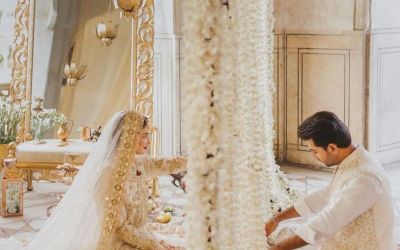Civil Marriage for Muslims 2025: A Complete Guide to Legal and Religious Practices
Table of Contents ▼
Is civil marriage for Muslims essential? Let’s dive into why it’s necessary to ensure both legal standing and religious legitimacy.
Muslim couples preparing for marriage often ask whether they should undergo a civil marriage for Muslims in addition to the nikah ceremony. The nikah ceremony is the religious union that makes the marriage halal, while the civil marriage ensures that the union is recognized legally by the government.
In this guide, we will explore why civil marriage for Muslims is so important and how it complements the nikah ceremony to secure both legal and religious recognition.
Both Ceremonies Serve Different Purposes
The nikah is the Islamic marriage ceremony that makes the relationship permissible in the eyes of Allah. It is the religious contract that binds the couple together in faith. However, a civil marriage for Muslims, performed at a courthouse or registry, ensures the marriage is legally recognized by the government. This grants couples legal rights such as property inheritance, medical decision-making, and tax benefits.
While the nikah secures the relationship spiritually, civil marriage ensures all legal protections and obligations are in place. For many couples, having both ceremonies is vital to cover all aspects of marriage—spiritual and legal.
Why Civil Marriage for Muslims is Crucial
Civil marriage provides significant legal advantages that the nikah alone cannot offer. These include:
- Visa and Immigration Benefits: Civil marriage is required for one spouse to obtain immigration benefits, such as residence permits.
- Inheritance and Property Rights: Civil marriage ensures the legal right to inherit assets from your spouse and grants property rights.
- Medical Decision-Making: In the event of illness, a civilly married spouse has legal authority to make important medical decisions.
- Tax Benefits: Married couples may receive tax benefits such as deductions and exemptions that are not available to unmarried couples.
- Custody and Legal Protection: If a couple separates, civil marriage ensures legal protection for both parties, including custody arrangements and division of assets.
For these reasons, many Muslim scholars encourage couples to complete both their religious and civil marriage ceremonies, especially in countries where legal recognition is essential.
Can Muslims Get Married in Civil Court?
Yes, Muslims can get married in civil court. In many non-Muslim countries, civil marriage is required for the marriage to be legally recognized by the state, regardless of whether a religious ceremony such as the nikah is performed.
Here are a few common approaches to handling civil and religious marriages:
- Nikah First, Civil Marriage Later: Many couples prefer to have their nikah first, which makes the marriage halal, and then complete the civil ceremony to ensure legal recognition.
- Civil Marriage First, Nikah Later: Some couples choose to complete the civil marriage first, especially if they need legal recognition for practical reasons like immigration, and then perform the nikah afterward to fulfill religious obligations.
- Simultaneous Nikah and Civil Marriage: Some imams are authorized to perform both civil and religious ceremonies at the same time, making it possible for couples to handle both aspects of marriage in one ceremony.
Regardless of the approach, it is important to ensure that both the religious and legal aspects of marriage are completed to guarantee full protection.
Want to know about the cost of civil marriage? Click Abu Dhabi Court Marriage Fee to learn more about it.
Is Civil Marriage for Muslims Islamically Acceptable?
Many Muslims are concerned about whether civil marriage aligns with Islamic principles. Most scholars agree that civil marriage for Muslims is acceptable as long as:
- The civil process does not require the couple to act in ways that violate Islamic teachings.
- All requirements for a valid nikah are fulfilled, including the proper religious contract.
- Both spouses understand that their marriage must adhere to Islamic guidelines.
The Prophet Muhammad (peace be upon him) taught Muslims to respect the laws of the land where they live, provided those laws do not contradict Islamic principles. Therefore, civil marriage is fully acceptable as long as it does not contradict Islamic teachings and is performed in accordance with Islamic values.
Common Approaches for Muslim Couples
Muslim couples approach the combination of civil and religious marriages in different ways depending on their circumstances and priorities:
- Religious First Approach: Some couples choose to have the nikah ceremony first, which immediately makes the marriage halal, and then complete the civil marriage later.
- Legal First Approach: Some couples opt to complete the civil ceremony first, particularly when legal issues such as immigration or financial matters are pressing, and then perform the nikah afterward.
- Same-Day Approach: If possible, many couples prefer to conduct both ceremonies on the same day. This can be accomplished by finding an imam authorized to perform both the civil and religious ceremony, ensuring everything is completed in one sitting.
Each approach ensures that both spiritual and legal aspects of the marriage are addressed, but the choice depends on personal preferences and the couple’s specific needs.
What Happens in a Civil Marriage for Muslims?
A civil marriage for Muslims involves several key steps:
- Marriage License Application: Couples must apply for a marriage license, providing necessary documentation such as proof of identity and other requirements.
- Brief Ceremony: The ceremony is typically brief, usually conducted by a judge or an authorized official, and includes the signing of marriage documents.
- Signing Legal Documents: The couple signs the legal marriage documents, making the union official in the eyes of the government.
- Witnesses: Similar to the nikah, two witnesses are required to ensure the validity of the civil marriage.
The civil ceremony is often quick, taking under 30 minutes, and is typically conducted in modest attire. Most couples save their traditional wedding outfits for the nikah ceremony.
Civil Marriage for Muslims: Requirements
Requirements for civil marriage vary significantly based on the country. Below are some of the general distinctions:
In Muslim-Majority Countries
- Turkey and Tunisia: Civil marriage is required before or alongside the nikah.
- Indonesia: In Indonesia, religious marriages are registered as civil marriages.
- Other Muslim-Majority Countries: Some countries have separate family law systems for Muslims, making religious marriages automatically legally recognized.
In Western and Non-Muslim Countries
- Civil Marriage Is Required: In most countries, civil marriage is mandatory for legal recognition.
- Religious Ceremonies Alone Are Not Legally Binding: Without civil registration, religious ceremonies alone do not grant legal standing.
- Authorized Religious Officials: Some countries allow authorized religious officials to conduct legally binding civil ceremonies, though this varies from region to region.
FAQs
Does a civil marriage replace the need for a nikah?
No. While civil marriage provides legal recognition, only a nikah makes the relationship halal according to Islamic law. Both are necessary for a complete marriage.
Can we just have a nikah without a civil marriage?
While this is possible, it leaves the couple without legal protections. This can be risky, particularly when it comes to issues like inheritance, property rights, and medical decisions.
Will the government recognize our Islamic marriage contract?
In most non-Muslim countries, a nikah alone will not be legally recognized. However, some countries may offer ways to recognize religious marriages or permit religious officials to perform legally binding ceremonies.
Final Thoughts
Muslims can get married in civil court, and it is often highly recommended to do so alongside the nikah ceremony. Civil marriage for Muslims ensures that both the legal and religious aspects of the union are recognized, offering essential protections for the couple.
Marriage in Islam is a source of love, peace, and mercy. By fulfilling both religious and legal requirements, couples can build a strong foundation for a lasting marriage.
If you’re considering civil marriage for Muslims and aren’t sure where to start, Easy Wedding is here to guide you every step of the way. Contact us today to begin your journey to a fully recognized marriage.


